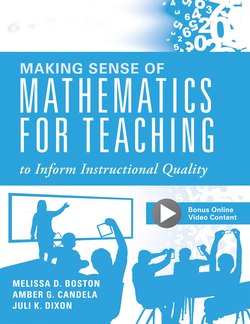Читать книгу Making Sense of Mathematics for Teaching to Inform Instructional Quality - Juli K. Dixon - Страница 5
На сайте Литреса книга снята с продажи.
ОглавлениеTable of Contents
About the Authors
Introduction
The Importance of Making Sense of Mathematics for Teaching
About This Book
PART 1: Connecting to the T in TQE: Tasks and Task Implementation
CHAPTER 1
Potential of the Task
Introductory Activities
Activity 1.1: Solving a Task
Activity 1.2: Considering Different Types of Tasks
The IQA Potential of the Task Rubric
Application Activities
Activity 1.3: Rating Mathematical Tasks Using the Potential of the Task Rubric
Activity 1.4: Using the IQA Potential of the Task Rubric to Rate and Adapt Tasks
Considerations When Rating Tasks
Defining the Task
Considering Implications of Higher-Level Thinking
Aligning With Learning Goals
Summary
CHAPTER 2
Implementation of the Task
Introductory Activities
Activity 2.1: Comparing Two Mathematics Lessons
The IQA Implementation of the Task Rubric
Application Activities
Activity 2.2: Using the Implementation of the Task Rubric
Activity 2.3: Identifying Evidence of Students’ Thinking and Reasoning in Students’ Work
Activity 2.4: Revisiting the Chapter 1 Transition Activity—Moving From Tasks to Implementation
Considerations for Implementation Based on Classroom Observations or Videos
Activity 2.5: Rating Implementation of the Task—Father and Son Race Lesson Version 1
Activity 2.6: Rating Implementation of the Task—Father and Son Race Lesson Version 2
Summary
PART 2: Connecting to the Q in TQE: Questions and Their Role as Discourse Actions
CHAPTER 3
Teacher’s Questions
Introductory Activities
Activity 3.1: Identifying Different Types of Questions
Activity 3.2: Sorting Questions
Activity 3.3: Creating Questions
Activity 3.4: Revisiting the Chapter 2 Transition Activity—How Teacher’s Questions Impact Implementation
The IQA Teacher’s Questions Rubric
Application Activities
Activity 3.5: Rating the Teacher’s Questions in the 26 Divided by 4 Lesson
Summary
CHAPTER 4
Teacher’s Linking and Teacher’s Press
Introductory Activities
Activity 4.1: Following Up on Students’ Contributions—Teacher’s Linking
Activity 4.2: Following Up on Students’ Contributions—Teacher’s Press
Activity 4.3: Revisiting the Chapter 3 Transition Activity—Teacher’s Questions and Follow-Up
The IQA Teacher’s Linking and Teacher’s Press Rubrics
Application Activities
Activity 4.4: Rating Teacher’s Linking and Teacher’s Press
Activity 4.5: Determining When It Is Appropriate to Ask a Follow-Up Question
Summary
PART 3: Connecting to the E in TQE: Evidence of Students’ Mathematical Work and Thinking
CHAPTER 5
Students’ Linking and Students’ Providing
Introductory Activities
Activity 5.1: Examining Students’ Contributions—Students’ Linking
Activity 5.2: Examining Students’ Contributions—Students’ Providing
Activity 5.3: Revisiting the Chapter 4 Transition Activity—Teacher’s Linking, Teacher’s Press, and Students’ Contributions
The IQA Students’ Linking and Students’ Providing Rubrics
Application Activities
Activity 5.4: Rating Students’ Linking and Students’ Providing
Summary
CHAPTER 6
The IQA Toolkit as a Tool to Assess and Improve Instructional Practice
Introductory Activities
Activity 6.1: Rating a Small-Group Lesson
Activity 6.2: Rating a Whole-Class Lesson
The IQA Rubrics as Tools to Reflect on and Improve Instruction
Application Activities
Activity 6.3: Considering the Teacher’s Reflection and Next Steps
Activity 6.4: Revisiting the Chapter 5 Transition Activity—Using All IQA Rubrics
Summary
EPILOGUE
Next Steps
APPENDIX A
The IQA Toolkit
IQA Potential of the Task Rubric
IQA Implementation of the Task Rubric
IQA Teacher’s Questions Rubric
IQA Teacher’s Linking Rubric
IQA Teacher’s Press Rubric
IQA Students’ Linking Rubric
IQA Students’ Providing Rubric
IQA Implementation Observation Tool
Framework for Different Types of Questions
APPENDIX B
Suggested Answers for Activity 1.4
APPENDIX C
Suggested Answers for Activity 3.2
APPENDIX D
Additional Support for Rating Tasks
Level 1
Level 2
Level 3
Level 4
APPENDIX E
List of Figures and Videos
References and Resources
Index
